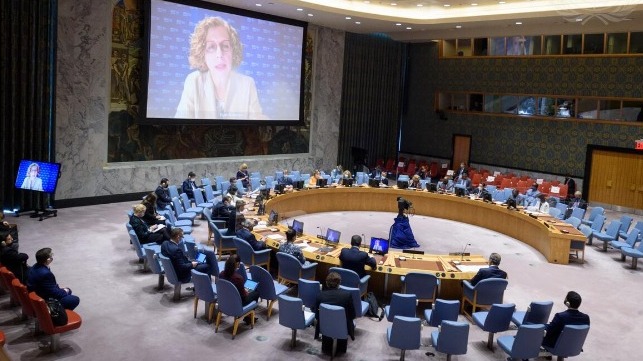UN Warned Decaying Oil Tanker has Become Houthi Bargaining Chip

The UN Security Council was briefed on the situation in Yemen with the decaying offshore oil storage tanker and the ongoing delays to reach an agreement to undertake a comprehensive inspection and perform light maintenance to defer the potential for a humanitarian and environmental crisis in the region. Warned of the devastating consequences for the region, the UN’s most powerful organization called on the Houthi rebels to honor their agreements and permit the critical mission to proceed while also being briefed on the contingency plans the UN has put in place if an oil leak occurs.
“Houthi militias are using the issue as a bargaining chip to advance their agenda,” Yemen’s permanent representative to the UN Abdullah Ali Fadhel al-Saadi warned the security council. He said that Yemen had identified the issue four years ago in 2017 warning of the dangers of the vessel which holds 1.1 million barrels of oil. “The Security Council must assume its responsibilities in order for United Nations technical teams to reach the tanker,” he noted, emphasizing that inaction could result in $20 billion in damages. He reiterated the need to conduct maintenance on the vessel and extract the oil, recommending that the oil should be sold to cover the costs of the operation.
In her briefing to the Council, Inger Andersen, Under-Secretary-General and Executive Director of the United Nations Environment Programme (UNEP) expressed regret about the lack of progress over the past year in assessing the risk of a massive oil leak or explosion from the Safer. “Making an assessment is critical to identify and reduce risks linked with the Safer,” she concluded while also briefing the Security Council on UN efforts to support readiness, contingency, and response planning in case of an oil spill.
She warned the Council that an oil spill or explosion could severely restrict the movement of vessels through the Red Sea, disrupting one of the busiest commercial routes in the world. Working with organizations across the region and the IMO, the UN has assisted in the development of regional and national contingency plans, as well as contracted a private company to provide updates in the event of a spill. These efforts have been paired with a series of capacity building workshops on responses at the regional and national levels, which involve training on the use of spill?response equipment and the use of dispersants.
The UN Security Council held its previous session dedicated to the situation on the FSO Safer in July 2020 and the rebels accepted terms for a scope of work for the project in November 2020, “but now seem unhappy with it,” said Reena Ghelani, Director for Operations and Advocacy at the United Nations Office for the Coordination of Humanitarian Affairs. She told the Security Council that progress has been much slower than anyone would have wanted, saying that while agreeing in principle to an operation, the rebels are reluctant to provide assurances it can proceed.
The main sticking point is around what the United Nations would exactly do on the Safer and why the organization is unable to specify what repairs will be carried out. However, UN officials continue to say because no independent technical mission has been able to access the tanker, it is not possible to determine what condition it is in or what work must be done. Currently, there is only a skeleton crew aboard the ship, but they continue to provide updates. The UN says that an expert team needs to verify what it is dealing with and what can be done, in addition to carrying out some light maintenance to minimize the risk of an oil spill and hopefully buy more time.
Ghelani concluded the briefing by saying that the expert team will remain on standby so long as donor funds are available, adding that, once a green light is given, it will still require several weeks to charter vessels, gather equipment, and set off from Djibouti to the Safer.

that matters most
Get the latest maritime news delivered to your inbox daily.
Over the past two years, the Under-Secretary-General for Humanitarian Affairs and Emergency Relief Coordinator has briefed the Security Council 23 times on the Safer, including in a meeting dedicated to the issue in July 2020. Yesterday’s 20-minute briefing concluded with a reiteration of the immediate danger and the need for a solution to what the experts called a ticking time bomb in the region.
